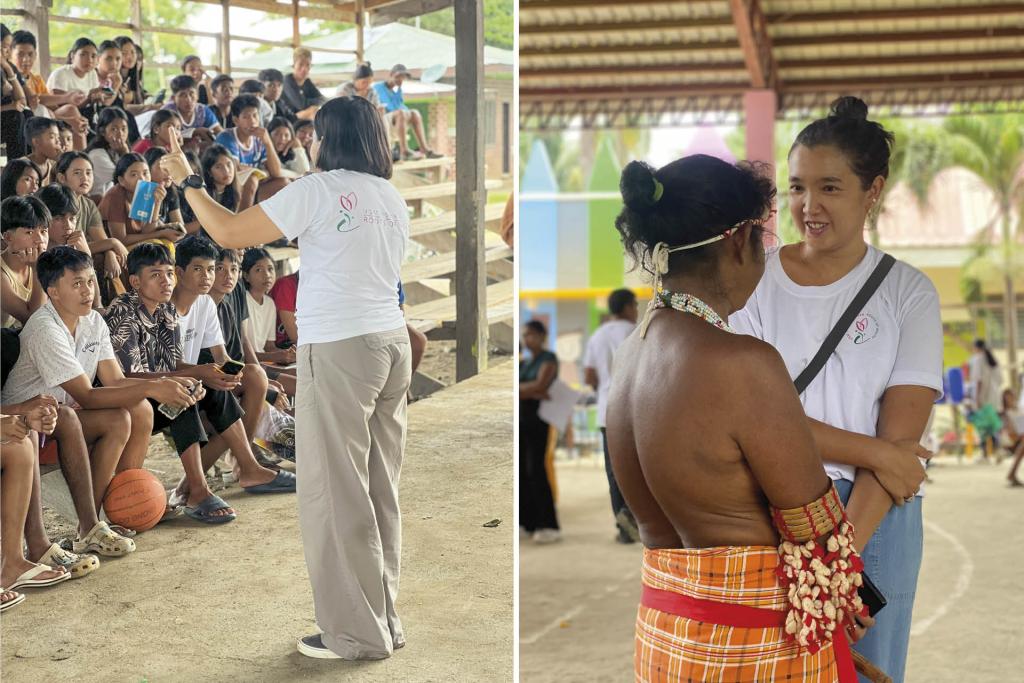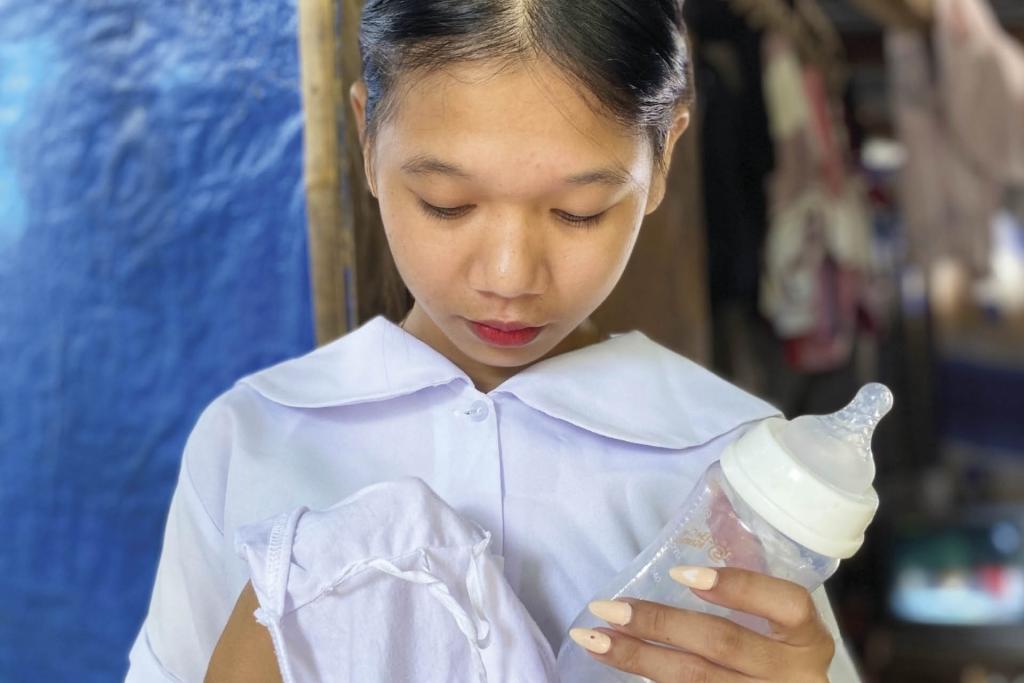A picture of health: New Rotary collaboration to address sexual health literacy in the Philippines
PICTURED: PHOTOS Roots of Health
For 15 years, Philippines non-profit Roots of Health has been active in the Province of Palawan, preventing the critical dangers that can arise from a lack of knowledge around topics such as HIV, teen pregnancy and STIs. Now, they’ve teamed up with Rotary’s Sexual Health Education by Pictures (SHEP) program to take their impact to new heights. Sarah Atkins spoke to SHEP Project Manager Shirley Cornish about her experience running the program, which took her from Kenya to Papua New Guinea to Timor-Leste.
By Sarah Atkins. President, No Borders Rotaract.
Ten years ago, in a community centre in Kenya, a thin but well-presented woman approached Shirley and breathlessly said, “I have… ten children… I have to stop”. She was so exhausted she could barely speak.
Travelling to Africa to attend a church celebration with her husband, John, Shirley started looking for ways to volunteer her expertise as a teacher. She came across the Kenyan non-profit organisation ICODEI (Volunteer Kenya), which had a woman’s health program dedicated to improving sexual health in rural communities.
Daily, ICODEI Operations Manager Mama Joyce and I bumped along country roads to homes, churches and schools,” Shirley recalls. “The women would be in the field working, and when they saw the unusual appearance of a jeep, they downed tools and came to us.”
Shirly’s teaching sessions began with song: the locals would welcome them with singing “so clear it took you to another place”. And then the women sat down and listened to every word.
The polite desperation of the locals she encountered was the beginning of the Sexual Health Education by Pictures program. Armed with her trusty copy of The Teacher’s Manual, compiled by medical students from the University of Illinois, US, Shirley travelled from village to village, with John alongside her to cover men’s health. He was “surprised by his ability to teach… we were both exhilarated,” she Shirley.
After returning to her home in Moruya, NSW, Shirley joined the local Rotary club. Not long after, Past President Pauline Gleeson, suggested she provide the same service in Timor-Leste. While excited to continue, she started thinking about how to develop teaching methods that were not constrained by language barriers.
“Pictures are perfect for this subject – almost instant knowledge.”
Shirley converted her trusted Teacher’s Manual into a compendium of diagrams and pictographs, wordlessly transmitting lifesaving knowledge into a form instantly recognisable regardless of local dialect, and hit the road once more.
“New opportunities just kept on coming… two medical missions in the Philippines. Two projects in the jungles of Papua New Guinea and Cambodia, a Rotarians Against Malaria fact-finding mission in Timor-Leste, and three programs with non-profit Mindanao Poverty Relief Action in the Philippines.”
Across each adventure, Shirley was immensely grateful to the locals for taking good care of her and John’s health and wellbeing as she provided her own teachings to them.
“We found a rewarding, challenging and exciting retirement.”
Now, Shirley’s teaching program, SHEP, has formed a partnership with International Service Director of the Rotary Club of Burwood, NSW, Walter Bock, and Philippines non-profit Roots of Health.

Founded in 2009 by Dr Susan Evangelista and her daughter Amina Evangelista Swanepoel, Roots of Health is the primary provider of sexual health services for the nearly one million people living in the Province of Palawan, Philippines.
As a professor at Palawan State University, Dr Evangelista was concerned about the number of students dropping out of university due to unplanned pregnancies and discovered a worrying lack of knowledge about contraceptives and sexually transmitted diseases.
Amina had recently graduated from Columbia University in New York City, US, with a double Masters Degree in International Affairs and Public Health.
Together, the two formed a desperately needed dream-team for a region that had no existing reproductive health organisation. Today, Roots of Health has provided contraceptive care to 50,000 women and screened 2,700 Palawan residents for HIV. And their effort is still very much ongoing.
We’re not done yet,” Amina says of their 15 years of work. “My dream is to see the same level of impact that we’ve achieved in Palawan spread across the entire country.”
As Executive Director, Amina continues to work in tandem with her mother, maintaining the massive impact of their vision.
The challenges of unplanned pregnancy, HIV and gender inequality are not confined to Palawan, and neither should our solutions be.”
In Palawan, Roots of Health has already provided the government’s extensive sexual education program to 96,000 young people. Their new program, Palawan+, teams with other initiatives nationwide to boost their reach, but the Philippines is one of the most linguistically diverse countries in the world.
With 13 regional languages, each with millions of speakers, and hundreds of unofficial languages and dialects, aid workers can have a difficult time sharing resources across the country. Roots of Health and Shirley’s Sexual Health Education by Pictures are therefore a perfect match.
The two programs found each other, incidentally, through Rotary Down Under: Walter Bock had already been tightly connected with aid in the Philippines through Mindanao Poverty Relief Action (MinPRA), when he came across Shirley’s SHEP initiative in an RDU article.
“Walter has been at the forefront of Rotary change and development since the 1970’s,” Shirley says. “He read the article in RDU, and soon Sexual Health Education by Pictures was being taught to 2,000 high school students by four MinPRA staff,” alongside Shirley herself. In 2024, this increased to 5,000 and Walter started looking for a way to apply for a Rotary global grant.
“Walter wanted to leave a legacy… after many conversations with Amina, he was confident that their vision, practice and aims aligned.”
In April 2025, Walter, his partner Lynn and Shirley travelled back to the Philippines to meet with the Philippines Global Grant Committee, Rotary clubs in Palawan, and members of the Roots of Health board with Amina. But Shirley says the most important opportunity was visiting sexual health classes in high schools for women within a displaced Indigenous community – the poorest of the Philippines’ 18 million people living below the poverty line.
“It is humbling to think about how many teenagers and families will benefit,” says Shirley. “Roots of Health has 44 medical, education and administrative staff. Walter’s global grant will double their program.”
The grant has an emphasis on preventing teen pregnancy and the spread of STIs. Since the 1960s, 100 million women worldwide have taken the pill. This has “clearly reduced family size and increased economies… sexual education can make this happen in the Philippines and other developing countries too,” says Shirley.
Walter is now aiming higher, aspiring to make the global grant perpetual. For this, he needs others within Rotary to lend their support. Already, Shirley says, “our time with Roots of Health exceeded expectations for their dedication, responsiveness to client needs, creativity and ability to work with the government and schools.”
Like clean water and consistent nutrition, many of us take for granted the knowledge and self-respect we have been given around sexual health, but billions of people across the globe have never received that opportunity.
There is quiet intensity in the real-life moments Shirley has experienced as an educator that leaves little doubt about why she continues her work. From the elegant, overwrought mother of 10 in Kenya to men at the back of the class quietly coming forward to ask about being tested for Syphilis, Shirley handles every case with gentle respect. Not every encounter is easy.

PICTURED: Rotary’s Sexual Health Education by Pictures is working with Philippines non-profit Roots of Health to help educate young teens like Trixie, who got pregnant at 17 and had to stop her studies to fulfil her role as a young mother. Trixie’s story is the story of many young people facing early responsibility. (Photo: Danilo/Roots of Health).
“In Timor-Leste, if a girl gets pregnant, boys are lined up. If one wants to marry her, she must marry him. If nobody wants her, she is turned out
of home.”
She notes that if the girl can make the baby disappear, she can come back again.
“This may seem harsh and dangerous, but in our own recent past, the only option for single mothers was a ‘holiday’ and to give the baby to a stranger.”
And so, even with the vast cultural differences she encounters, Shirley emphasises the importance of listening and keeping a cool head before judgement.
“I feel very privileged to gain insights into wildly different cultures and lives. There is much to learn… we have time to share and understand.”
Related news
Project Bravery Bear
Bravery Bears have comforted mor than 550 kids receiving medical procedures at Kalgoorlie Health Campus.
A seed of connection blossoms into life-saving impact
The Early Detection of Neonatal Brain Damage project in Türkiye will benefit up to 1,000 newborn babies every year.
Wellbeing through service: Rotary’s impact on global health
From clean water to peacebuilding, Rotary’s seven areas of focus are all deeply connected to improving global health.
Join our newsletter for the latest updates
"*" indicates required fields


